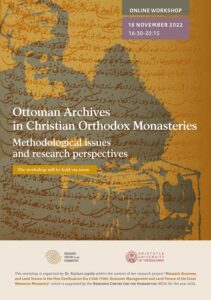Summary of the Research Proposal
The proposed research, based on the unpublished Ottoman archive of the Holy Monastery of the Transfiguration located in Meteora, Thessaly (known as the Great Meteoron), seeks to reconstruct aspects of the economic and social history of the Ottoman period under a predetermined perspective.
More specifically, the Great Meteoron monastery is approached as a socio-economic unit within the Ottoman administrative framework during the late 16th century and throughout the 17th century and consequently the monastic economy is studied within the same context. The archival material under study covers the period between the years 1568 and 1700 and amounts to about 600 documents of various types. The work plan includes the translation of Ottoman documents, the processing of their data and drawing of conclusions, aiming to integrate the findings into a broader dialogue.
The year 1568, which has been chosen as the starting point of this research, marks a turning point in the history of monastic economy, as it marked the transition from a vague legal framework to a more inelastic one, which challenged the legitimacy of monastic property and imposed its confiscation. Monastic property passed into the possession of the Ottoman state and after that their predecessors were given the opportunity to buy it back. Subsequently monasteries made a laborious effort to recover and manage their confiscated property, which we are trying to record.
With regard to the issue of confiscation but mainly of the post-confiscation period, it is worth noting that the studies carried out so far have focused mainly on the legal aspect of the confiscation issue. Drawing from the acquired knowledge, the proposed research chooses to follow a pragmatic perspective and seeks to study the economic and social aspects of the issue. It attempts to outline the financial profile of the monastery, the management strategies of the “crisis” of 1568 and its economic consequences as well as the mechanisms of survival and development of the monastery during the 17th century. The characteristics of monastic land ownership and its management are also examined. In addition, it is traced the monastery’s network of relations with the central and provincial administration as well as with its wider social and ecclesiastical environment. Finally, and to the extent that the data of the archival material allow it, the environmental dimension will be sought so as to demonstrate how the monastery managed the natural space in the areas where they owned land and if there are changes in its use over time.
Ottoman Archives in Christian Orthodox Monasteries: Methodological issues and research perspectives
The workshop will be held via zoom.
Zoom link: https://us02web.zoom.us/j/85455621973?pwd=ejRCNXRGODlvVFoyYU9OaHZDcjJGQT09
The event will also be streamed online on Facebook: https://fb.me/e/2doDZqtvp
This workshop is organized by Dr. Styliani Lepida within the context of her research project “Monastic Economy and Land Tenure in the Post-Confiscation Era (1568-1700): Economic Management and Land Tenure of the Great Meteoron Monastery” which is supported by the Research Centre for the Humanities (RCH) for the year 2022.
You may watch live here: https://fb.watch/gTknm9PNDv/
PROGRAM
16.30-16.50 Welcome
Kostas Gavroglu, RCH Founding Member; Emeritus Professor of History of Science, University of Athens
Styliani Lepida, Postdoctoral Researcher, Research Centre for the Humanities Scholar – Aristotle University of Thessaloniki
SESSION 1
Chair: Styliani Lepida
16.50 – 17.10 Eugenia Kermeli, Professor, Institute of Turkish Studies – Hacettepe University, “Ottoman Juridical Practice and the Concept of Justice among Ottoman Orthodox”
17.10 – 17.30 Molly Greene, Professor, Princeton University, “The Documentary Trail of a Remote Region”
17.30 – 17.50 Phokion Kotzageorgis, Associate Professor, Aristotle University of Thessaloniki, “What can an Ottomanist find in an Ottoman Monastic Archive?”
17.50 – 18.20 Discussion – Q&A
18.20 – 18.40 Break
SESSION 2
Chair: Phokion Kotzageorgis
18.40 – 19.00 Vanessa R. de Obaldía, Postdoctoral Researcher, ERC Starting Grant Project MAMEMS – Johannes Gutenberg University of Mainz, “The Cataloguing of the Ottoman Holdings of Simonopetra Monastery: Between Traditional Documentation and the Digital Humanities”
19.00 – 19.20 Efthimios Maheras, PhD Candidate, University of Crete, “Dealing with an Insular Monastic Archive: The Documents of the Monastery of Saint John the Theologian of Patmos”
19.20 – 19.40 Styliani Lepida, Postdoctoral Researcher, Research Centre for the Humanities Scholar – Aristotle University of Thessaloniki, “Ottoman Documents on the Socio-Economic Status of the Great Meteoron Monastery in the Post-Confiscation Era (late 16th-17th century)”
19.40 – 20.10 Discussion – Q& A
20.10 – 20.15 Closing Comments – End of the Workshop
Research: “Monastic Economy and land Tenure in the Post-Confiscation Era (1568-1700): Economic Management and Land Tenure of the Great Meteoron Monastery”
Research Team: Styliani Lepida
The research project “Monastic Economy and land Tenure in the Post-Confiscation Era (1568-1700): Economic Management and Land Tenure of the Great Meteoron Monastery” was funded by the Research Centre for the Humanities (RCH) for the year 2022.
Extended Summary
The present study focuses on the post-confiscation monastic economy and land ownership, which is approached through the case study of the Great Meteoron monastery. The archival material used is consisted of Ottoman documents from the aforementioned monastery’s archive. Monastic economic activity is outlined through a variety of documents, such as sultanic orders, court documents, receipts, opinions, registers and others, and in this context the interactions between monastery and its social environment as well as the Ottoman administrative authorities are also examined.
The Great Meteoron monastery, dealing with the confiscation issue (1568-9), was forced on the one hand to accept the new legal framework imposed by Sultan Selim II and on the other hand to find ways in order to handle the loss and the acquisition of its confiscated properties. Borrowing, mainly from Trikala Muslims and Islamic waqfs, was the main method used by monks to cope with this extraordinary financial situation. Debts caused by loans and taxes constituted monastery’s largest financial expenditure during the late 16th century. This financial burden, in the course of the 17th century and under the pressure of wider economic conditions prevailing in the Ottoman empire, became even bigger.
Nevertheless, throughout this period, Meteoron monastery kept investing, mainly in arable land (fields), uncultivated land (pastures, meadows) and vineyards, apparently in an attempt to reverse its financial situation, strengthen or replenish its properties but also meeting its financial needs and obligations. The largest concentration of land properties is recorded in villages closed to the monastery, such as Kastraki, Zavlandia and Koprina.
Meteoron monastery’s effort to preserve its acquis can be easily detected in its Ottoman archival documents. In this context, monks did not hesitate to oppose to the local Ottoman authorities but also to the Christians of the nearby areas and even to the monasteries themselves, whenever their rights were infringed. By petitions to the sultan, monks tried to secure their legal acquisitions, providing as evidence mainly the defters, and most of the time they succeeded in securing the issuance of a ferman. However, the frequent repetition in the issuing of such orders shows that the whole process was rather a dead letter. In reality, pressure and arbitrariness on the part of the various officials continued, indicating a functional gap between the order and its implementation and lack of coordination between the administrative center and the periphery.
The fact of confiscation acted as a borderline to the status of monastic land ownership and economy, since, as confirmed by the case of the Meteoron monastery, it deprived monasteries of the right of full ownership (mülk) in arable land and uncultivated land (meadows, pastures) providing them the right of usufruct (tasarruf) instead. However, it seems that it was not enough to prevent their survival -even with losses- during the demanding 17th century. Nevertheless, in some cases monasteries managed to expand their property, exhibiting flexible economic and social behavior both in extraordinary economic and political circumstances as well as in inelastic economic, social and administrative contexts, such as those of the Ottoman late-16th and 17th century.
The full academic report for this research’s results is available in Greek. To view it, click here and browse to the tab “Αποτελέσματα Έρευνας”.

Styliani Lepida is a postdoctoral researcher at the Department of History and Archeology of the Aristotle University of Thessaloniki, where she also completed her undergraduate (BA, History, 2008) and postgraduate studies (MA, Turkology, 2011). In 2019 she defended her doctoral dissertation under the title: Aspects of the Ottoman Provincial Administration in the 17th century. The case-study of Cyprus, at the Department of Turkish and Middle Eastern Studies of the University of Cyprus, from where she received her doctorate in Ottoman History. During her doctoral studies she was granted scholarships by the State Scholarships Foundation of Greece (IKY) (2013-2015) and the University of Cyprus (2016-2017, 2017-2018). She has authored articles in scientific journals as well as chapters in collective volumes and she has participated in international conferences. She participated in the international research project “Does monastic economy matter? Religious patterns of economic behavior” organized by the Center for Advanced Study Sofia (CAS), as a researcher during the period 2019-2020. Her research interests are focused on the economic and social history of the Ottoman period and on issues of provincial administration, with an emphasis on the 17th century.

